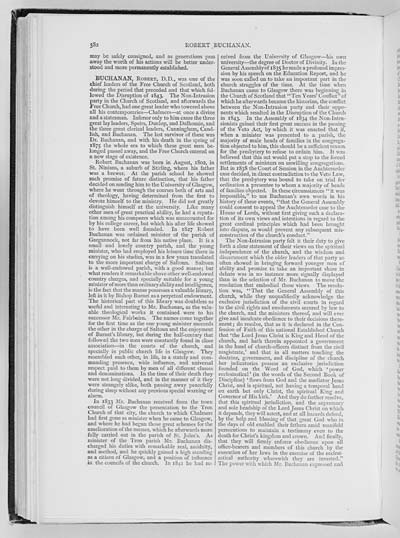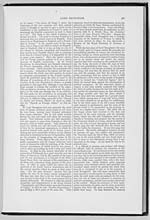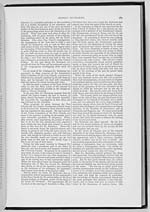Volume 3 > Half-Volume 6
(228) Page 582 - Buchanan, Robert
Download files
Individual page:
Thumbnail gallery: Grid view | List view

582 may be safely consigned, and as generations pass away the worth of his actions will be better under- stood and more permanently established. BUCHANAN, ROBERT, D.D., was one of the chief leaders of the Free Church of Scotland, both during the period that preceded and that which fol- lowed the Disruption of 1843. The Non-Intrusion party in the Church of Scotland, and afterwards the Free Church, had one great leader who towered above all his contemporaries�Chalmers�at once a divine and a statesman. Inferior only to him came the three great lay leaders, Speirs, Dunlop, and Dalhousie, and the three great clerical leaders, Cunningham, Cand- lish, and Buchanan. The last survivor of these was Dr. Buchanan, and with his death in the spring of 1875 the whole era to which these great men be- longed passed away, and the Free Church entered on a new stage of existence. Robert Buchanan was born in August, 1802, in St. Ninians, a suburb of Stirling, where his father was a brewer. At the parish school he showed such promise of future distinction, that his father decided on sending him to the University of Glasgow, where he went through the courses both of arts and of theology, having determined from the first to devote himself to the ministry. He did not greatly distinguish himself at the university. Like many other men of great practical ability, he had a reputa- tion among his compeers which was unaccounted for by his college career, but which his after life showed to have been well founded. In 1827 Robert Buchanan was ordained minister of the parish of Gargunnock, not far from his native place. It is a small and lonely country parish, and the young minister, who had employed his leisure time there in carrying on his studies, was in a few years translated to the more important charge of Saltoun. Saltoun is a well-endowed parish, with a good manse; but what renders it remarkable above other well-endowed country charges, and specially suitable for a young minister of more than ordinary ability and intelligence, is the fact that the manse possesses a valuable library, left in it by Bishop Burnet as a perpetual endowment. The historical part of this library was doubtless as useful and interesting to Mr. Buchanan, as the valu- able theological works it contained were to his successor Mr. Fairbairn. The names come together for the first time as the one young minister succeeds the other in the charge of Saltoun and the enjoyment of Burnet's library, but during the half-century that followed the two men were constantly found in close association�in the courts of the church, and specially in public church life in Glasgow. They resembled each other, in life, in a stately and com- manding presence, wide influence, and universal respect paid to them by men of all different classes and denominations. In the time of their death they were not long divided, and in the manner of it they were strangely alike, both passing away peacefully during sleep without any previous special warning or alarm. In 1833 Mr. Buchanan received from the town council of Glasgow the presentation to the Tron Church of that city, the church to which Chalmers had first gone as minister when he came to Glasgow, and where he had begun those great schemes for the amelioration of the masses, which he afterwards more fully carried out in the parish of St. John's. As minister of the Tron parish Mr. Buchanan dis- charged his duties with remarkable zeal, assiduity, and method, and he quickly gained a high standing as a citizen of Glasgow, and a position of influence in the councils of the church. In 1841 he had re- ceived from the University of Glasgow�his own university�the degree of Doctor of Divinity. In the General Assembly of 1835 he made a profound impres- sion by his speech on the Education Report, and he was soon called on to take an important part in the church struggles of the time. At the time when Buchanan came to Glasgow there was beginning in the Church of Scotland that "Ten Years' Conflict" of which he afterwards became the historian, the conflict between the Non-Intrusion party and their oppo- nents which resulted in the Disruption of the Church in 1843. In the Assembly of 1834 the Non-Intru- sionists gained their first great success in the passing of the Veto Act, by which it was enacted that if, when a minister was presented to a parish, the majority of male heads of families in the congrega- tion objected to him, this should be a sufficient reason, for the presbytery to refuse to ordain him. It was believed that this act would put a stop to the forced settlements of ministers on unwilling congregations. But in 1838 the Court of Session in the Auchterarder case decided, in direct contradiction to the Veto Law, that the presbytery was bound to take on trial for ordination a presentee to whom a majority of heads of families objected. In these circumstances " it was impossible," to use Buchanan's own words in his history of these events, "that the General Assembly could consent to appeal the Auchterarder case to the House of Lords, without first giving such a declara- tion of its own views and intentions in regard to the great cardinal principles which had been brought into dispute, as would prevent any subsequent mis- construction of the church's conduct." The Non-Intrusion party felt it their duty to give forth a clear statement of their views on the spiritual independence of the church, and the wisdom and discernment which the older leaders of that party so often showed in bringing forward younger men of ability and promise to take an important share in debate was in no instance more signally displayed than in the selection of Mr. Buchanan to move the resolution that embodied those views. The resolu- tion was, "That the General Assembly of this church, while they unqualifiedly acknowledge the exclusive jurisdiction of the civil courts in regard to the civil rights and emoluments secured by law to the church, and the ministers thereof, and will ever give and inculcate obedience to their decisions there- anent; do resolve, that as it is declared in the Con- fession of Faith of this national Established Church that 'the Lord Jesus Christ is King and Head of the church, and hath therein appointed a government in the hand of church-officers distinct from the civil magistrate,' and that in all matters touching the doctrine, government, and discipline of the church her judicatories possess an exclusive jurisdiction founded on the Word of God, which 'power ecclesiastical' (in the words of the Second Book of Discipline) ' flows from God and the mediator Jesus Christ, and is spiritual, not having a temporal head on earth but only Christ, the spiritual King and Governor of His kirk.' And they do farther resolve, that this spiritual jurisdiction, and the supremacy and sole headship of the Lord Jesus Christ on which it depends, they will assert, and at all hazards defend, by the help and blessing of that great God who in the days of old enabled their fathers amid manifold persecutions to maintain a testimony even to the death for Christ's kingdom and crown. And finally, that they will firmly enforce obedience upon all office-bearers and members of this church by the execution of her laws in the exercise of the ecclesi- astical authority wherewith they are invested." The power with which Mr. Buchanan expressed and
Set display mode to:
![]() Universal Viewer |
Universal Viewer | ![]() Mirador |
Large image | Transcription
Mirador |
Large image | Transcription
Images and transcriptions on this page, including medium image downloads, may be used under the Creative Commons Attribution 4.0 International Licence unless otherwise stated. ![]()
| Biographical dictionary of eminent Scotsmen > Volume 3 > Half-Volume 6 > (228) Page 582 - Buchanan, Robert |
|---|
| Permanent URL | https://digital.nls.uk/74514730 |
|---|---|
| Attribution and copyright: |
|
| Description | Volume III. Contains names alphabetically from Macadam to Young. |
|---|

